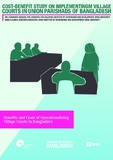Cost-benefit study on implementing village courts in union parishads of Bangladesh
Abstract
Justice is considered an important element of public service in any state. Apart from the formal system of justice in Bangladesh, two types of rural justice systems are prevalent amongst the rural community: Non-rural justice systems and state-led rural justice systems. Village Court is constituted under specific laws in 2006 and functions under the institutional framework of a Union Parishad (UP) Council. The goal behind conducting this study was to propose an intervention of judicial reform that leads to better governance in Bangladesh. This paper notes that not only are court cases expensive, limiting justice for the most impoverished and least influential citizens, but the country also has a backlog of approximately 2.7 million rural legal cases, with the average case taking 5 years. The paper proposes to increase the authority and number of local village courts so that people could get faster and much cheaper legal opportunities. If implemented, village court cases would be resolved in approximately 30-90 days, and each villager would save an estimated Tk 100,000 in avoided legal fees. Village courts lead to smoother and faster processing of trials, decrease case backlogs, and increase access to justice, while dramatically reducing the cost of justice. With extra costs of Tk 18 million (Tk 1.8 crore) per village court over 30 years, but overall savings of Tk 319 million (Tk 31.9 crore) per court, each taka spent toward this effort brings an estimated 18 takas in return. The paper aimed to conduct a cost-benefit analysis to provide empirical evidence that such government-led interventions have the potential to enhance access to justice for the common citizens of UPs while also improving the governance process in the judicial system of Bangladesh and concludes that the benefits will outweigh the cost to a greater extent.

